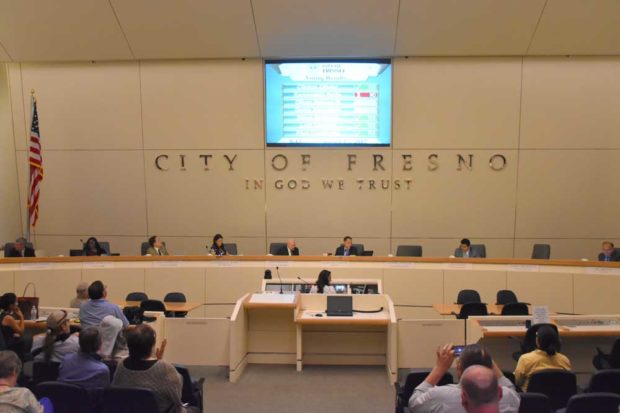
By Norman M. Lambert
There is an interesting power play going on currently in Fresno. We have criminalized the homeless (the lowest rung on the ladder of life) and subsidized (welfare for the rich) giant corporations to hopefully bless our city with their largesse (a few jobs).
On Feb. 4, 2018, the Fresno Bee tackled the Fresno camping ban. The report found that Fresno police made 1,447 contacts. Of those, 1,345 picked up their stuff and moved on to a different location. Some rode with the police to the Fresno Rescue Mission for services. In all, 941 encampments were cleared. Of course, only to be set up in another place the next day.
Is dealing with the homeless a proper job for the police? Wouldn’t they be better utilized dealing with criminals and criminal activities rather than hounding helpless, homeless individuals?
Fresno City Council Member Esmeralda Soria said that the ordinance doesn’t address the root of the homeless problem. Instead, she said, it criminalizes poverty. She said further that even if every person contacted by the police accepted services, the capacity is not there. “We heard it that day when we voted on the ordinance.”
Council Member Steve Brandau said that “the ordinance is working perfectly.” The ordinance, according to him, revealed that Fresno’s nonprofit partners were not equipped to aid the large number of homeless in the city. Now the problem is not the city’s but the charitable organizations attempting to ameliorate the homeless problem. That is truly passing the buck big time!
However, instead of spending some practical money on the homeless problem, the city government has forged ahead on providing welfare for giant corporations in hopes that Fresno will get some sorely needed jobs.
Here is some background on the nationwide picture of corporate welfare being provided by American cities and states. One of those welfare recipients is the giant corporation Amazon that recently made a lucrative deal with Fresno. Amazon is a big player in the corporate welfare game. Nationwide, Amazon garnered an average of $68 million yearly in local and state subsidies from 2005 to 2014. Then in 2015 and 2016, the amount jumped to $177 million per year.
Beyond Amazon, here’s a look at the nationwide corporate welfare grab. Good Jobs First found 386 incentive deals since 1976 that gave at least $50 million to a corporation. And then they tallied the number of jobs created. The average cost per job was $658,427 each. Far more than cities and states can recover through sales, property and other taxes, probably more than job holders would pay in taxes their entire lifetimes.
New York gave a $258 million subsidy to Yahoo and got 125 jobs—costing taxpayers $2 million per job. Oregon awarded $2 billion to Nike and got 500 jobs—at a cost of $4 million per job.
The Institute for Local Self- Reliance at the end of 2015 found that Amazon did employ 146,000 people in its U.S. operations. But, the Institute calculated that this taxpayer-supported behemoth had meanwhile eliminated some 295,000 U.S. retail jobs.
The city of Fresno claimed that it put $12 million–$15 million in infrastructure—water, sewer and other utilities—to prepare for the coming of Amazon and Ulta. Fresno then promised Amazon a rebate of 90% of the city’s share of property taxes plus rebates on its entire share of sales and use taxes paid on purchases made in the city for 30 years. The city required that Amazon hire at least 750 full-time jobs to get their incentives. Amazon has said that it would probably provide 2,000 jobs in the near future.
The property tax subsidy amounts to $15.3 billion for 30 years, plus $750,000 in sales tax rebates. If one applies one-half of the infrastructure costs to Amazon and adds on the property tax rebates and the sales tax rebates and divides that total by 2,000 jobs, it works out to $26,783 per year per individual in actual cost to the city. There is not the slightest possibility that an individual working for Amazon will be able to pay anywhere close to that amount in 30 years as those employees will likely be working for $14 per hour, leaving the city holding the bag big time.
San Bernardino has enticed three gigantic Amazon warehouses, all subsidized to the hilt to open up for business. For the amazing results, look at the poverty rate there; in 2016, it was 28.1%. This is compared to 23.4% in 2011 the year before Amazon arrived. Median household income in San Bernardino in 2016 was $38,450, 4% lower than in 2011.
Further afield, Amazon warehouses in Ohio have been shown to have the sad rate of one in 10 Amazon workers being on food stamps.
How is it that the city of Fresno can subsidize giant corporations to the tune of millions of dollars but cannot scrape up even a meager million to begin to take proper care of the homeless citizens in the city?
*****
Norman M. Lambert resides in southeast Fresno. He served on the Fresno County Grand Jury a few years ago and has been involved in housing issues in south Fresno the past several years. Contact him at barbaraandnorman@ comcast.net.

[…] way, rather than treating them like errant children who needed to be punished. Council President Esmeralda Soria made a motion to rescind the Homeless No Camping ban. Her motion passed 7-0 with Council Member […]